2016专八改革--详细篇
- 格式:docx
- 大小:891.20 KB
- 文档页数:16
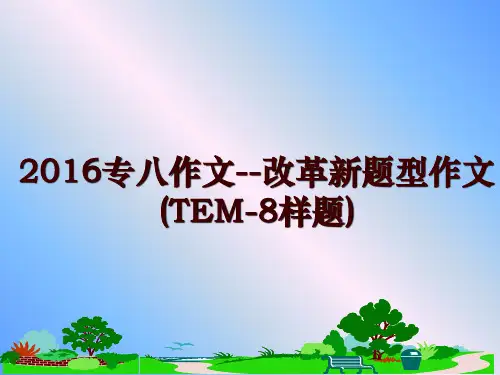
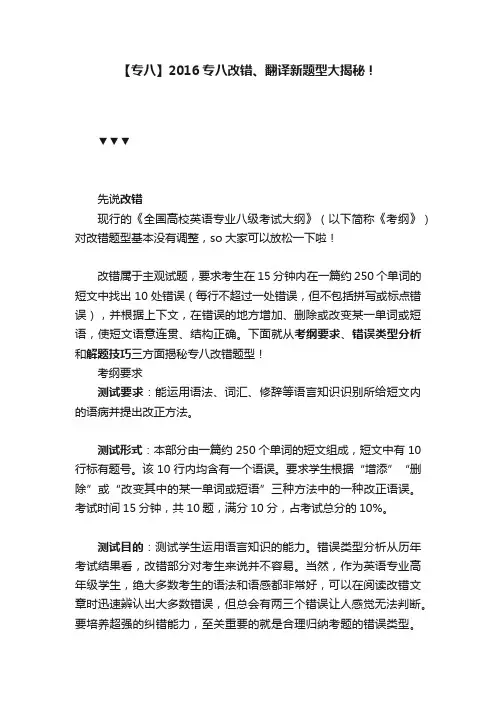
【专八】2016专八改错、翻译新题型大揭秘!▼▼▼先说改错现行的《全国高校英语专业八级考试大纲》(以下简称《考纲》)对改错题型基本没有调整,so大家可以放松一下啦!改错属于主观试题,要求考生在15分钟内在一篇约250个单词的短文中找出10处错误(每行不超过一处错误,但不包括拼写或标点错误),并根据上下文,在错误的地方增加、删除或改变某一单词或短语,使短文语意连贯、结构正确。
下面就从考纲要求、错误类型分析和解题技巧三方面揭秘专八改错题型!考纲要求测试要求:能运用语法、词汇、修辞等语言知识识别所给短文内的语病并提出改正方法。
测试形式:本部分由一篇约250个单词的短文组成,短文中有10行标有题号。
该10行内均含有一个语误。
要求学生根据“增添”“删除”或“改变其中的某一单词或短语”三种方法中的一种改正语误。
考试时间15分钟,共10题,满分10分,占考试总分的10%。
测试目的:测试学生运用语言知识的能力。
错误类型分析从历年考试结果看,改错部分对考生来说并不容易。
当然,作为英语专业高年级学生,绝大多数考生的语法和语感都非常好,可以在阅读改错文章时迅速辨认出大多数错误,但总会有两三个错误让人感觉无法判断。
要培养超强的纠错能力,至关重要的就是合理归纳考题的错误类型。
只要掌握了错误的规律,注意力就可以集中在容易出错的地方,从而发现错误。
专八考试改错部分出现的错误通常分为三大类:词法错误、句法错误和篇章错误。
纵观近年考试真题可以发现:▎7大词法错误1. 名词数的混淆;2. 介词(误用或缺失);3. 动词误用;4. 形容词或副词比较级误用;5. 冠词误用(冗余);6. 固定短语误用;7. 词义、词类混淆。
▎7大句法错误1. 时态错误;2. 语态错误;3. 非谓语动词误用;4. 固定句型误用;5. 关系代词或副词的误用;6. 主谓不一致;7. 主要成分(主语、谓语或宾语)多余。
▎3大篇章错误1. 指代错误;2. 衔接错误;3. 上下文语义矛盾。
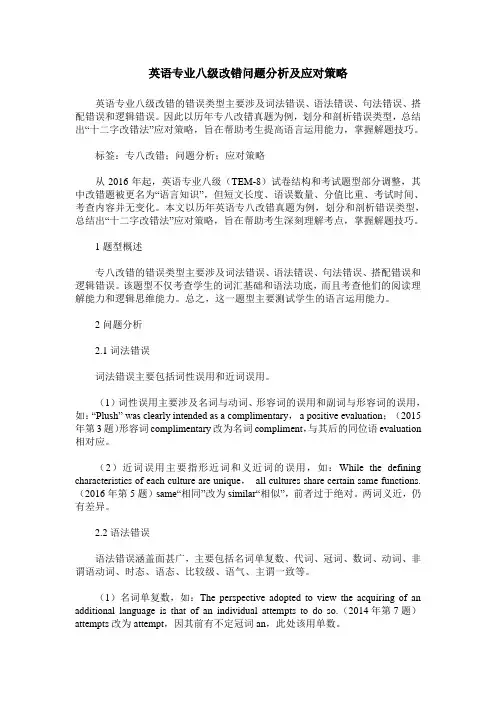
英语专业八级改错问题分析及应对策略英语专业八级改错的错误类型主要涉及词法错误、语法错误、句法错误、搭配错误和逻辑错误。
因此以历年专八改错真题为例,划分和剖析错误类型,总结出“十二字改错法”应对策略,旨在帮助考生提高语言运用能力,掌握解题技巧。
标签:专八改错;问题分析;应对策略从2016年起,英语专业八级(TEM-8)试卷结构和考试题型部分调整,其中改错题被更名为“语言知识”,但短文长度、语误数量、分值比重、考试时间、考查内容并无变化。
本文以历年英语专八改错真题为例,划分和剖析错误类型,总结出“十二字改错法”应对策略,旨在帮助考生深刻理解考点,掌握解题技巧。
1题型概述专八改错的错误类型主要涉及词法错误、语法错误、句法错误、搭配错误和逻辑错误。
该题型不仅考查学生的词汇基础和语法功底,而且考查他们的阅读理解能力和逻辑思维能力。
总之,这一题型主要测试学生的语言运用能力。
2问题分析2.1词法错误词法错误主要包括词性误用和近词误用。
(1)词性误用主要涉及名词与动词、形容词的误用和副词与形容词的误用,如:“Plush” was clearly intended as a complimen tary,a positive evaluation;(2015年第3題)形容词complimentary改为名词compliment,与其后的同位语evaluation 相对应。
(2)近词误用主要指形近词和义近词的误用,如:While the defining characteristics of each culture are unique,all cultures share certain same functions. (2016年第5题)same“相同”改为similar“相似”,前者过于绝对。
两词义近,仍有差异。
2.2语法错误语法错误涵盖面甚广,主要包括名词单复数、代词、冠词、数词、动词、非谓语动词、时态、语态、比较级、语气、主谓一致等。

专八改革新政及备考建议作者:纪军来源:《新东方英语》2016年第03期2015年8月,高校外语专业教学测试办公室发布了《关于英语专业八级考试(TEM 8)题型调整方案》,并宣布从2016年起对专八考试的试卷结构和测试题型做局部调整。
试卷共包含五部分:听力理解、阅读理解、语言知识、翻译和写作。
考试时间为155分钟。
改革后的专八题型有以下调整:取消新闻听力和人文知识;取消翻译的英译汉,保留汉译英;听力理解讲座部分的长度变长,题量增多,由原来的10道题变为15道题;写作部分不再考查话题作文,而是要求考生先阅读1000词左右的文章,然后再做摘要型议论文写作。
改革后的专八考试更注重语言的灵活运用,侧重考查考生综合运用英语进行交际的能力。
新专八究竟有何具体变化?面对新变化应如何备考?如何在冲刺阶段做到有的放矢,事半功倍?本文笔者将结合新专八各部分题型介绍改革内容,并为考生提供冲刺阶段的备考建议。
听力理解改革后的听力理解包含两项:讲座(Mini-lecture)和会话/访谈(Conversation or Interview)。
考试时间为25分钟,原有的新闻听力取消。
下面笔者分别介绍讲座和会话/访谈的题型特点及备考建议。
1 讲座该部分由一个约900词的讲座和一项填空任务组成,考查形式为听录音填空。
要求考生边听边记笔记,然后完成填空任务。
讲座录音只播放一遍。
每道题需填答案的长度不超过三个单词。
根据官方样题中的讲座“Understanding Academic Lectures”,考生可以看出改革后该部分录音的选材并未改变。
备考建议不少考生觉得该题型很难,其实并非如此。
考生在听录音之前有30秒的预读时间,可以提前浏览答题卡上的填空任务,了解自己要重点听哪些信息,答题难度由此减半。
此外,根据题目要求,该部分题目答案并不唯一,考生只要填入语义和语法都正确的答案即可得分。
例如,官方样卷第1题需要考生填入“意义载体”的对应英文,无论考生填入carriers of meaning、meaning carriers还是parts of language皆可得分。
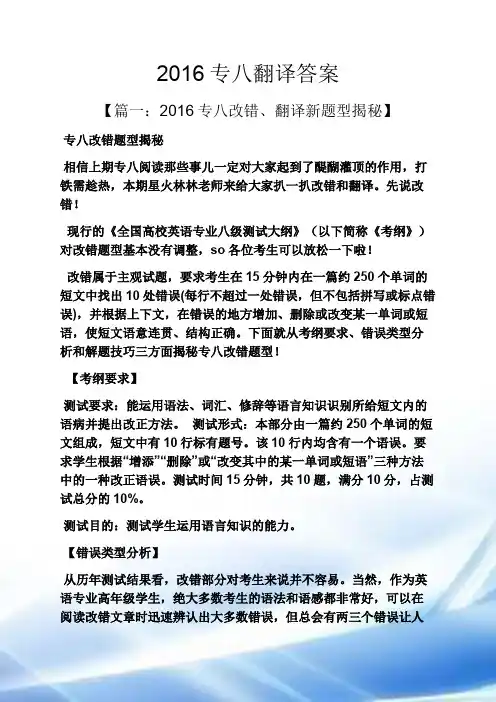
2016专八翻译答案【篇一:2016专八改错、翻译新题型揭秘】专八改错题型揭秘相信上期专八阅读那些事儿一定对大家起到了醍醐灌顶的作用,打铁需趁热,本期星火林林老师来给大家扒一扒改错和翻译。
先说改错!现行的《全国高校英语专业八级测试大纲》(以下简称《考纲》)对改错题型基本没有调整,so各位考生可以放松一下啦!改错属于主观试题,要求考生在15分钟内在一篇约250个单词的短文中找出10处错误(每行不超过一处错误,但不包括拼写或标点错误),并根据上下文,在错误的地方增加、删除或改变某一单词或短语,使短文语意连贯、结构正确。
下面就从考纲要求、错误类型分析和解题技巧三方面揭秘专八改错题型!【考纲要求】测试要求:能运用语法、词汇、修辞等语言知识识别所给短文内的语病并提出改正方法。
测试形式:本部分由一篇约250个单词的短文组成,短文中有10行标有题号。
该10行内均含有一个语误。
要求学生根据“增添”“删除”或“改变其中的某一单词或短语”三种方法中的一种改正语误。
测试时间15分钟,共10题,满分10分,占测试总分的10%。
测试目的:测试学生运用语言知识的能力。
【错误类型分析】从历年测试结果看,改错部分对考生来说并不容易。
当然,作为英语专业高年级学生,绝大多数考生的语法和语感都非常好,可以在阅读改错文章时迅速辨认出大多数错误,但总会有两三个错误让人感觉无法判断。
要培养超强的纠错能力,至关重要的就是合理归纳考题的错误类型。
只要掌握了错误的规律,注意力就可以集中在容易出错的地方,从而发现错误。
是不是觉得事半功倍呢?专八测试改错部分出现的错误通常分为三大类:词法错误、句法错误和篇章错误。
纵观近年测试真题可以发现:7大词法错误包括:1. 名词数的混淆;2. 介词(误用或缺失);3. 动词误用;4. 形容词或副词比较级误用;5. 冠词误用(冗余);6. 固定短语误用;7. 词义、词类混淆。
7大句法错误包括:1. 时态错误;2. 语态错误;3. 非谓语动词误用;4. 固定句型误用;5. 关系代词或副词的误用;6. 主谓不一致;7. 主要成分(主语、谓语或宾语)多余。
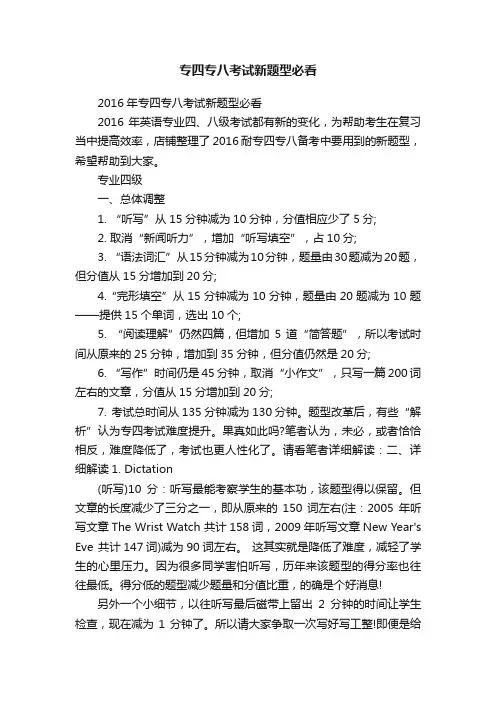
专四专八考试新题型必看2016年专四专八考试新题型必看2016年英语专业四、八级考试都有新的变化,为帮助考生在复习当中提高效率,店铺整理了2016耐专四专八备考中要用到的新题型,希望帮助到大家。
专业四级一、总体调整1. “听写”从15分钟减为10分钟,分值相应少了5分;2. 取消“新闻听力”,增加“听写填空”,占10分;3. “语法词汇”从15分钟减为10分钟,题量由30题减为20题,但分值从15分增加到20分;4.“完形填空”从15分钟减为10分钟,题量由20题减为10题——提供15个单词,选出10个;5. “阅读理解”仍然四篇,但增加5道“简答题”,所以考试时间从原来的25分钟,增加到35分钟,但分值仍然是20分;6. “写作”时间仍是45分钟,取消“小作文”,只写一篇200词左右的文章,分值从15分增加到20分;7. 考试总时间从135分钟减为130分钟。
题型改革后,有些“解析”认为专四考试难度提升。
果真如此吗?笔者认为,未必,或者恰恰相反,难度降低了,考试也更人性化了。
请看笔者详细解读:二、详细解读1. Dictation(听写)10分:听写最能考察学生的基本功,该题型得以保留。
但文章的长度减少了三分之一,即从原来的150词左右(注:2005年听写文章The Wrist Watch 共计158词,2009年听写文章New Year's Eve 共计147词)减为90词左右。
这其实就是降低了难度,减轻了学生的心里压力。
因为很多同学害怕听写,历年来该题型的得分率也往往最低。
得分低的题型减少题量和分值比重,的确是个好消息!另外一个小细节,以往听写最后磁带上留出2分钟的时间让学生检查,现在减为1分钟了。
所以请大家争取一次写好写工整!即便是给你2分钟,也来不及重新抄写一遍。
2.Listening Comprehension (听力理解)20分Section A Talk(讲座)10分:新增题型Gap-filling(填空)。
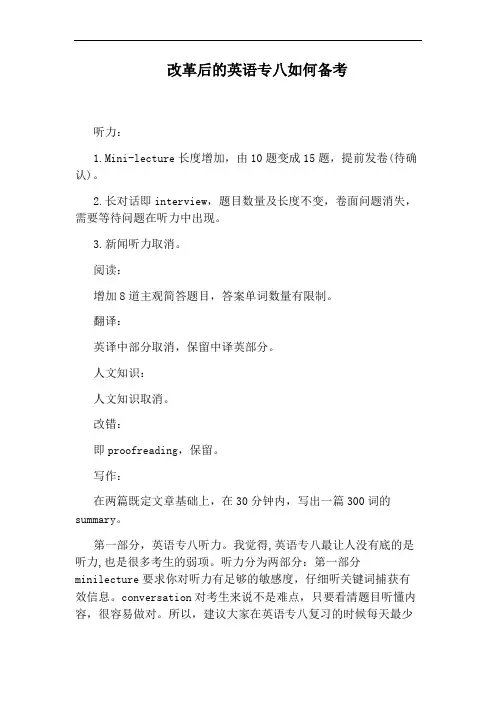
改革后的英语专八如何备考听力:1.Mini-lecture长度增加,由10题变成15题,提前发卷(待确认)。
2.长对话即interview,题目数量及长度不变,卷面问题消失,需要等待问题在听力中出现。
3.新闻听力取消。
阅读:增加8道主观简答题目,答案单词数量有限制。
翻译:英译中部分取消,保留中译英部分。
人文知识:人文知识取消。
改错:即proofreading,保留。
写作:在两篇既定文章基础上,在30分钟内,写出一篇300词的summary。
第一部分,英语专八听力。
我觉得,英语专八最让人没有底的是听力,也是很多考生的弱项。
听力分为两部分:第一部分minilecture要求你对听力有足够的敏感度,仔细听关键词捕获有效信息。
conversation对考生来说不是难点,只要看清题目听懂内容,很容易做对。
所以,建议大家在英语专八复习的时候每天最少30分钟时间练习听力,多听VOA和BBC新闻材料中的一些新闻报道、短评或讲话等。
其次,练习记笔记,锻炼自己的速记能力。
第二部分,英语专八阅读。
阅读这个东西也不是那么让人轻松的,所以平时也要练习。
30分钟做四篇将近3000字的阅读,的确让人头痛。
所以首先,要调整好阅读的心态,保持心里平静。
其次一定要分配好时间,阅读题每篇的速度可以在7分钟左右,时间的长短可以视文章的难度而适当调整。
刚开始练习的时候最多不超过10分钟一篇,尽量一次做俩篇,这样的话,强度不算太大,也容易接受,20分钟内搞定,按照这种强度进行训练俩周后,大概也就找到了英语专八的感觉了。
阅读时的方法就是:首先拿到阅读题先看文章的每段的首句和末句,而且只看首句和末句,对于首句和末句的阅读一定要切记,只有这样才能把握住文章的中心思想和每段大意,只有这样才能在规定的时间里做完4篇阅读。
其次,选项可以先读,也可以后读,再有就是题干一定要读。
还要注意题干中的特殊标志词。
第三部分,英语专八语言知识即改错,这个题也不太好做,主要是一些语法错误,语篇错误,以及词汇的错误。
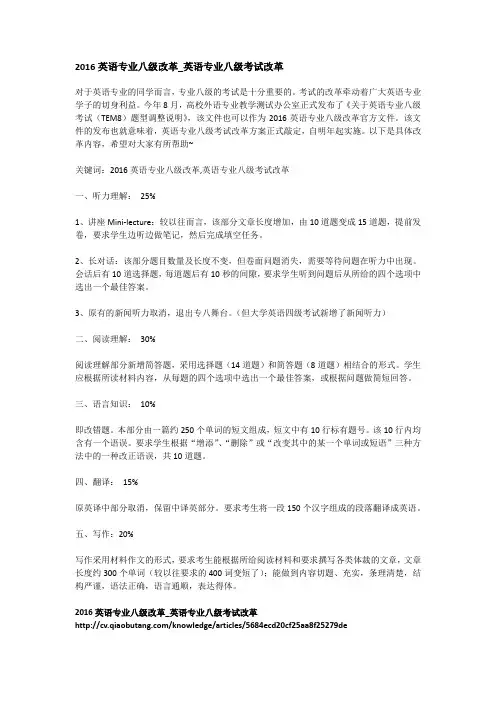
2016英语专业八级改革_英语专业八级考试改革对于英语专业的同学而言,专业八级的考试是十分重要的。
考试的改革牵动着广大英语专业学子的切身利益。
今年8月,高校外语专业教学测试办公室正式发布了《关于英语专业八级考试(TEM8)题型调整说明》,该文件也可以作为2016英语专业八级改革官方文件。
该文件的发布也就意味着,英语专业八级考试改革方案正式敲定,自明年起实施。
以下是具体改革内容,希望对大家有所帮助~关键词:2016英语专业八级改革,英语专业八级考试改革一、听力理解:25%1、讲座Mini-lecture:较以往而言,该部分文章长度增加,由10道题变成15道题,提前发卷,要求学生边听边做笔记,然后完成填空任务。
2、长对话:该部分题目数量及长度不变,但卷面问题消失,需要等待问题在听力中出现。
会话后有10道选择题,每道题后有10秒的间隙,要求学生听到问题后从所给的四个选项中选出一个最佳答案。
3、原有的新闻听力取消,退出专八舞台。
(但大学英语四级考试新增了新闻听力)二、阅读理解:30%阅读理解部分新增简答题,采用选择题(14道题)和简答题(8道题)相结合的形式。
学生应根据所读材料内容,从每题的四个选项中选出一个最佳答案,或根据问题做简短回答。
三、语言知识:10%即改错题。
本部分由一篇约250个单词的短文组成,短文中有10行标有题号。
该10行内均含有一个语误。
要求学生根据“增添”、“删除”或“改变其中的某一个单词或短语”三种方法中的一种改正语误,共10道题。
四、翻译:15%原英译中部分取消,保留中译英部分。
要求考生将一段150个汉字组成的段落翻译成英语。
五、写作:20%写作采用材料作文的形式,要求考生能根据所给阅读材料和要求撰写各类体裁的文章,文章长度约300个单词(较以往要求的400词变短了);能做到内容切题、充实,条理清楚,结构严谨,语法正确,语言通顺,表达得体。
2016英语专业八级改革_英语专业八级考试改革/knowledge/articles/5684ecd20cf25aa8f25279de。

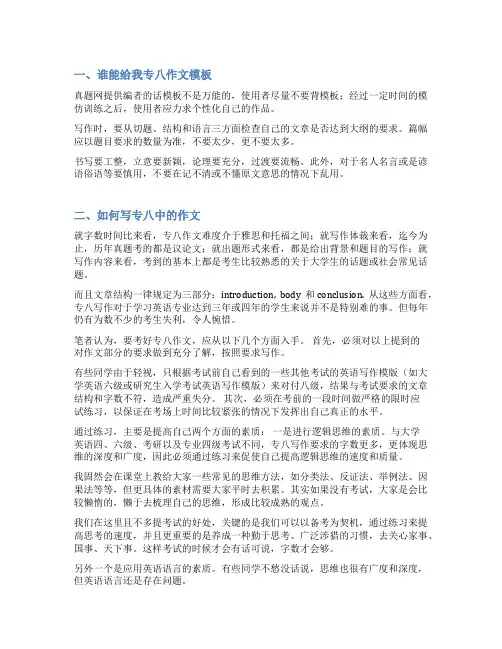
一、谁能给我专八作文模板真题网提供编者的话模板不是万能的,使用者尽量不要背模板;经过一定时间的模仿训练之后,使用者应力求个性化自己的作品。
写作时,要从切题、结构和语言三方面检查自己的文章是否达到大纲的要求。
篇幅应以题目要求的数量为准,不要太少,更不要太多。
书写要工整,立意要新颖,论理要充分,过渡要流畅。
此外,对于名人名言或是谚语俗语等要慎用,不要在记不清或不懂原文意思的情况下乱用。
二、如何写专八中的作文就字数时间比来看,专八作文难度介于雅思和托福之间;就写作体裁来看,迄今为止,历年真题考的都是议论文;就出题形式来看,都是给出背景和题目的写作;就写作内容来看,考到的基本上都是考生比较熟悉的关于大学生的话题或社会常见话题。
而且文章结构一律规定为三部分:introduction, body 和conclusion. 从这些方面看,专八写作对于学习英语专业达到三年或四年的学生来说并不是特别难的事。
但每年仍有为数不少的考生失利,令人惋惜。
笔者认为,要考好专八作文,应从以下几个方面入手。
首先,必须对以上提到的对作文部分的要求做到充分了解,按照要求写作。
有些同学由于轻视,只根据考试前自己看到的一些其他考试的英语写作模版(如大学英语六级或研究生入学考试英语写作模版)来对付八级,结果与考试要求的文章结构和字数不符,造成严重失分。
其次,必须在考前的一段时间做严格的限时应试练习,以保证在考场上时间比较紧张的情况下发挥出自己真正的水平。
通过练习,主要是提高自己两个方面的素质:一是进行逻辑思维的素质。
与大学英语四、六级、考研以及专业四级考试不同,专八写作要求的字数更多,更体现思维的深度和广度,因此必须通过练习来促使自己提高逻辑思维的速度和质量。
我固然会在课堂上教给大家一些常见的思维方法,如分类法、反证法、举例法、因果法等等,但更具体的素材需要大家平时去积累。
其实如果没有考试,大家是会比较懒惰的,懒于去梳理自己的思维,形成比较成熟的观点。
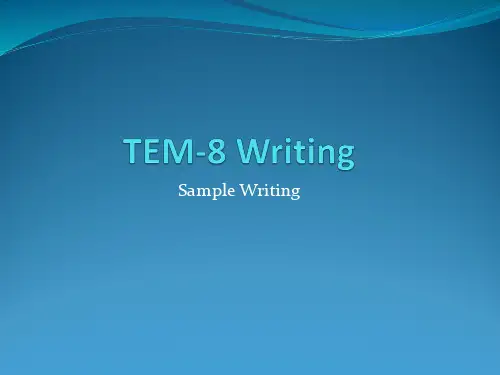
2016英语专⼋考试真题与答案解析QUESTION BOOKLETTEST FOR ENGLISH MAJORS (2016)-GRADE EIGHT-TIME LIMIT: 150 MINPART I LISTENING COMPREHENSION [25 MIN]SECTION A MINI-LECTUREIn this section you will hear a mini-lecture. You will hear the mini-lecture ONCE ONLY. While listening to the mini-lecture, please complete the gap-filling task on ANSWER SHEET ONE and write NO MORE THAN THREE WORDS for each gap. Make sure the word(s) you fill in is (are) both grammatically and semantically acceptable. You may use the blank sheet for note-taking.You have THIRTY seconds to preview the gap-filling task.Now listen to the mini-lecture. When it is over, you will be given THREE minutes to check your work.SECTION B INTERVIEWIn this section you will hear ONE interview. The interview will be divided into TWO parts. At the end of each part, five questions will be asked about what was said. Both the interview and the questions will be spoken ONCE ONLY. After each question there will be a ten-second pause. During the pause, you should read the four choices of A, B, C and D, and mark the best answer to each question on ANSWER SHEET TWO.You have THIRTY seconds to preview the questions.Now, listen to the Part One of the interview. Questions 1 to 5 are based on Part One of the interview.1. A. Maggie’s university life.B. Her mom’s life at Harvard.C. Maggie’s view on studying with Mom.D. Maggie’s opinion on her mom’s major.2. A. They take exams in the same weeks.B. They have similar lecture notes.C. They apply for the same internship.D. They follow the same fashion.3. A. Having roommates.B. Practicing court trails.C. Studying together.D. Taking notes by hand.4. A. Protection.B. Imagination.C. Excitement.D. Encouragement.5. A. Thinking of ways to comfort Mom.B. Occasional interference from Mom.C. Ultimately calls when Maggie is busy.D. Frequent check on Maggie’s grades.Now, listen to the Part Two of the interview. Questions 6 to 10 are based on Part Two of the interview.6. A. Because parents need to be ready for new jobs.B. Because parents love to return to college.C. Because kids require their parents to do so.D. Because kids find it hard to adapt to college life.7. A. Real estate agent.B. Financier.C. Lawyer.D. Teacher.8. A. Delighted.B. Excited.C. Bored.D. Frustrated.9. A. How to make a cake.B. How to make omelets.C. To accept what is taught.D. To plan a future career.10.A. Unsuccessful.B. Gradual.C. Frustrating.D. Passionate.PART II READING COMPREHENSION [45 MIN] SECTION A MULTIPLE-CHOICE QUESTIONSIn this section there are three passages followed by fourteen multiple choice questions. For each multiple choice question, there are four suggested answers marked A, B, C and D. Choose the one that you think is the best answer and mark your answers on ANSWER SHEET TWO.PASSAGE ONE(1)There was music from my neighbor’s house through the summer nights. In his blue gardens men and girls came and went like moths among the whisperings and the champagne and the stars. At high tide in the afternoon I watched his guests diving from the tower of his raft or taking the sun on the hot sand of his beach while his two motor-boats slit the waters of the Sound, drawing aquaplanes(滑⽔板)over cataracts of foam. On weekends Mr. Gatsby’s Rolls-Royce became an omnibus, bearing parties to and from the city between nine in the morning and long past midnight, while his station wagon scampered like a brisk yellow bug to meet all trains. And on Mondays eight servants, including an extra gardener, toiled all day with scrubbing-brushes and hammer and garden-shears, repairing the ravages of the night before.(2)Every Friday five crates of oranges and lemons arrived from a fruiterer in New York – every Monday these same oranges and lemons left his back door in a pyramid of pulpless halves. There was a machine in the kitchen which could extract the juice of two hundred oranges in half an hour, if a little button was pressed two hundred times by a butler’s thumb.(3)At least once a fortnight a corps of caterers came down with several hundred feet of canvas and enough colored lights tomake a Christmas tree of Gatsby’s enormous garden. On buffet tables, garnished with glistening hors-d’oeuvre(冷盘), spiced baked hams crowded against salads of harlequin designs and pastry pigs and turkeys bewitched to a dark gold. In the main hall a bar with a real brass rail was set up, and stocked with gins and liquors and with cordials(加⾹甜酒)so long forgotten that most of his female guests were too young to know one from another.(4)By seven o’clock the orchestra has arrived– no thin five-piece affair but a whole pitful of oboes and trombones and saxophones and viols and cornets and piccolos and low and high drums. The last swimmers have come in from the beach now and are dressing upstairs; the cars from New York are parked five deep in the drive, and already the halls and salons and verandas are gaudy with primary colors and hair shorn in strange new ways, and shawls beyond the dreams of Castile. The bar is in full swing, and floating rounds of cocktails permeate the garden outside until the air is alive with chatter and laughter and casual innuendo and introductions forgotten on the spot and enthusiastic meetings between women who never knew each other’s names.(5)The lights grow brighter as the earth lurches away from the sun and now the orchestra is playing yellow cocktail music and the opera of voices pitches a key higher. Laughter is easier, minute by minute, spilled with prodigality, tipped out at a cheerful word.(6)The groups change more swiftly, swell with new arrivals, dissolve and form in the same breath –already there are wanderers, confident girls who weave here and there among the stouter and more stable, become for a sharp, joyous moment the center of a group and then excited with triumph glide on through the sea-change of faces and voices and color under the constantly changing light.(7)Suddenly one of these gypsies in trembling opal, seizes a cocktail out of the air, dumps it down for courage and moving her hands like Frisco dances out alone on the canvas platform. A momentary hush; the orchestra leader varies his rhythm obligingly for her and there is a burst of chatter as the erroneous news goe s around that she is Gilda Gray’s understudy from the Folies. The party has begun.(8)I believe that on the first night I went to Gatsby’s house I was one of the few guests who had actually been invited. People were not invited –they went there. They got into automobiles which bore them out to Long Island and somehow they ended up at Gatsby’s door. Once there they were introduced by somebody whoknew Gatsby, and after that they conducted themselves according to the rules of behavior associated with amusement parks. Sometimes they came and went without having met Gatsby at all, came for the party with a simplicity of heart that was its own ticket of admission.(9)I had been actually invited. A chauffeur in a uniform crossed my lawn early that Saturday morning with a surprisingly formal note from his employer – the honor would be entirely Gatsby’s, it said, if I would attend his “little party” that night. He had seen me several times and had intended to call on me long before but a peculiar combination of circumstances had prevented it –signed Jay Gatsby in a majestic hand.(10)Dressed up in white flannels I went over to his lawn a little after seven and wandered around rather ill-at-ease among swirls and eddies of people I didn’t know – though here and there was a face I had noticed on the commuting train.I was immediately struck by the number of young Englishmen dotted about; all well dressed, all looking a little hungry and all talking in low earnest voices to solid and prosperous Americans. I was sure that they were selling something: bonds or insurance or automobiles. They were, at least, agonizingly aware of the easy money in the vicinity and convinced that it was theirs for a few words in the right key.(11)As soon as I arrived I made an attempt to find my host but the two or three people of whom I asked his whereabouts stared at me in such an amazed way and denied so vehemently any knowledge of his movements that I slunk off in the direction of the cocktail table – the only place in the garden where a single man could linger without looking purposeless and alone.11.It can be inferred form Para. 1 that Mr. Gatsby ______ through the summer.A.entertained guests from everywhere every weekendB.invited his guests to ride in his Rolls-Royce at weekendsC.liked to show off by letting guests ride in his vehiclesD.indulged himself in parties with people from everywhere12.In Para.4, the word “permeate” probably means ______.A.perishB.pushC.penetrateD.perpetrate13.It can be inferred form Para. 8 that ______.A.guests need to know Gatsby in order to attend his partiesB.people somehow ended up in Gatsby’s house as guestsC.Gatsby usually held garden parties for invited guestsD.guests behaved themselves in a rather formal manner14.According to Para. 10, the author felt ______ at Gatsby’s party.A.dizzyB.dreadfulC.furiousD.awkward15.What can be concluded from Para.11 about Gatsby?A.He was not expected to be present at the parties.B.He was busy receiving and entertaining guests.C.He was usually out of the house at the weekend.D.He was unwilling to meet some of the guests.PASSAGE TWO(1)The Term “CYBERSPACE” was coined by William Gibson, a science-fiction writer. He first used it in a short story in 1982, and expanded on it a couple of years later in a novel, “Neuromancer”, whose main character, Henry D orsett Case, is a troubled computer hacker and drug addict. In the book Mr Gibson describes cyberspace as “a consensual hallucination experienced daily by billions of legitimate operators” and “a graphic representation of data abstracted from the banks of every computer in the human system.”(2)His literary creation turned out to be remarkably prescient(有先见之明的). Cyberspace has become shorthand for the computing devices, networks, fibre-optic cables, wireless links and other infrastructure that bring the internet to billions of people around the world. The myriad connections forged by these technologies have brought tremendous benefits to everyone who uses the web to tap into humanity’s collective store of knowledge every day.(3)But there is a darker side to this extraordinary invention. Data breaches are becoming ever bigger and more common. Last year over 800m records were lost, mainly through such attacks. Among the most prominent recent victims has been Target, whose chief executive, Gregg Steinhafel, stood down from his job in May, a few months after the giant American retailer revealed that online intruders had stolen millions of digital records about its customers, including credit- anddebit-card details. Other well-known firms such as Adobe, a tech company, and eBay, an online marketplace, have also been hit.(4) The potential damage, though, extends well beyond such commercial incursions. Wider concerns have been raised by the revelations about the mass surveillance carried out by Western intelligence agencies made by Edward Snowden, a contractor to America’s National Security Agency (NSA), as well as by the growing numbers of cyber-warriors being recruited by countries that see cyberspace as a new domain of warfare. America’s president, Barack Obama, said in a White House press release earlier this year that cyber-threats “pose one of the gravest national-security dangers” the country is facing. (5)Securing cyberspace is hard because the architecture of the internet was designed to promote connectivity, not security. Its founders focused on getting it to work and did not worry much about threats because the network was affiliated with America’s military. As hackers turned up, layers of security, from antivirus programs to firewalls, were added to try to keep them at bay. Gartner, a research firm, reckons that last year organizations around the globe spent $67 billion on information security.(6)On the whole, these defenses have worked reasonably well. For all the talk about the risk of a “cyber 9/11”, the internet has proved remarkably resilient. Hundreds of millions of people turn on their computers every day and bank online, shop at virtual stores, swap gossip and photos with their friends on social networks and send all kinds of sensitive data over the web without ill effect. Companies and governments are shifting ever more services online.(7)But the task is becoming harder. Cyber-security, which involves protecting both data and people, is facing multiple threats, notably cybercrime and online industrial espionage, both of which are growing rapidly. A recent estimate by the Centre for Strategic and International Studies (CSIS), puts the annual global cost of digital crime and intellectual-property theft at $445 billion –a sum roughly equivalent to the GDP of a smallish rich European country such as Austria.(8)To add to the worries, there is also the risk of cyber-sabotage. Terrorists or agents of hostile powers could mount attacks on companies and systems that control vital parts of an economy, including power stations, electrical grids and communications networks. Such attacks are hard to pull off, but not impossible. One precedent is the destruction in 2010 of centrifuges(离⼼机)at a nuclear facility in Iran by a computer program known as Stuxnet.(9)But such events are rare. The biggest day-to-day threats faced by companies and government agencies come from crooks and spooks hoping to steal financial data and trade secrets. For example, smarter, better-organized hackers are making life tougher for the cyber-defenders, but the report will argue that even so a numberof things can be done to keep everyone safer than they are now.(10)One is to ensure that organizations get the basics of cyber-security right. All too often breaches are caused by simple blunders, such as failing to separate systems containing sensitive data from those that do not need access to them. Companies also need to get better at anticipating where attacks may be coming from and at adapting their defences swiftly in response to new threats. Technology can help, as can industry initiatives that allow firms to share intelligence about risks with each other.(11)There is also a need to provide incentives to improve cyber-security, be they carrots or sticks. One idea is to encourage internet-service providers, or the companies that manage internet connections, to shoulder more responsibility for identifying and helping to clean up computers infected with malicious software. Another is to find ways to ensure that software developers produce code with fewer flaws in it so that hackers have fewer security holes to exploit.(12)An additional reason for getting tech companies to give a higher priority to security is that cyberspace is about to undergo another massive change. Over the next few years billions of new devices, from cars to household appliances and medical equipment, will be fitted with tiny computers that connect them to the web and make them more useful. Dubbed “the internet of things”, this is already making it possible, for example, to control home appliances using smartphone apps and to monitor medical devices remotely.(13)But unless these systems have adequate security protection, the internet of things could easily become the internet of new things to be hacked. Plenty of people are eager to take advantage of any weaknesses they may spot. Hacking used to be about geeky college kids tapping away in their bedrooms to annoy their elders. It has grown up with a vengeance.16.Cyberspace is described by William Gibson as ______.A. a function only legitimate computer operators haveB. a representation of data from the human systemC.an important element stored in the human systemD.an illusion held by the common computer users17.Which of the following statements BEST summarizes the meaning of the firstfour paragraphs?A.Cyberspace has more benefits than defects.B.Cyberspace is like a double-edged sword.C.Cyberspace symbolizes technological advance.D.Cyberspace still remains a sci-fi notion.18.According to Para. 5, the designing principles of the internet and cyberspacesecurity are ______.A.controversial/doc/7f0db29f0aa1284ac850ad02de80d4d8d05a0163.html plimentaryC.contradictoryD.congruent19.What could be the most appropriate title for the passage?A.Cyber Crime and Its Prevention.B.The Origin of Cyber Crime.C.How to Deal with Cyber Crime.D.The Definition of Cyber Crime.PASSAGE THREE(1)You should treat skeptically the loud cries now coming from colleges and universities that the last bastion of excellence in American education is being gutted by state budget cuts and mounting costs. Whatever else it is, higher education is not a bastion of excellence. It is shot through with waste, lax academic standards and mediocre teaching and scholarship.(2)True, the economic pressures – from the Ivy League to state systems –are intense. Last year, nearly two-thirds of schools had to make midyear spending cuts to stay within their budgets. It is also true (as university presidents and deans argue) that relieving those pressures merely by raising tuitions and cutting courses will make matters worse. Students will pay more and get less. The university presidents and deans want to be spared from further government budget cuts. Their case is weak. (3)Higher education is a bloated enterprise. Too many professors do too little teaching to too many ill-prepared students. Costs can be cut and quality improved without reducing the number of graduates. Many colleges and universities should shrink. Some should go out of business. Consider:Except for elite schools, admissions standards are low. About 70 percent of freshmen at four-year colleges and universities attend their first-choice schools. Roughly 20 percent go to their second choices. Most schools have eagerly boosted enrollments to maximize revenues (tuition and statesubsidies).●Dropout rates are high. Half or more of freshmen don’t get degrees. A recentstudy of PhD programs at 10 major universities also found high dropout rates for doctoral candidates.●The attrition among undergraduates is particularly surprising becausecollege standards have apparently fallen. One study of seven top schools found widespread grade inflation. In 1963, half of the students in introductory philosophy courses got a B –or worse. By 1986, only 21 percent did. If elite schools have relaxed standards, the practice is almost surely widespread.●Faculty teaching loads have fallen steadily since the 1960s. In majoruniversities, senior faculty members often do less than two hours a day of teaching. Professors are “socialized to publish, teach graduate students and spend as little time teaching (undergraduates) as possible,” concludes James Fairweather of Penn State University in a new study. Faculty pay consistently rises as undergraduate teaching loads drop.●Universities have encouraged an almost mindless explosion of graduatedegrees. Since 1960, the number of masters’ degrees awarded annually has risen more than fourfold to 337,000. Between 1965 and 1989, the annual number of MBAs (masters in business administration) jumped from 7,600 to 73,100.(4)Even so, our system has strengths. It boasts many top-notch schools and allows almost anyone to go to college. But mediocrity is pervasive. We push as many freshmen as possible through the door, regardless of qualifications. Because bachelors’ degrees are so common, we create more graduate degrees of dubious worth. Does anyone believe the MBA explosion has improved management?(5)You won’t hear much about this from college deans or university presidents. They created this mess and are its biggest beneficiaries. Large enrollments support large faculties. More graduate students liberate tenured faculty from undergraduate teaching to concentrate on writing and research: the source of status. Richard Huber, a former college dean, writes knowinglyin a new book (“How Professors Play the Cat Guarding the Cream: Why We’re Paying More and Getting Less in Higher Education”): Presidents, deans and trustees ... call for more recognition of good teaching with prizes and salary incentives.(6)The reality is closer to the experience of Harvard University’s distinguished paleontologist Stephen Jay Gould: “To be perfectly honest, though lip service is given to teaching, I have never seriously heard teaching consideredin any meeting for promotion... Writing is the currency of prestige and promotion.”(7)About four-fifths of all students attend state-subsidized systems, from community colleges to prestige universities. How governors and state legislatures deal with their budget pressures will be decisive. Private schools will, for better or worse, be influenced by state actions. The states need to do three things.(8)First, create genuine entrance requirements. Today’s low sta ndards tell high school students: You don’t have to work hard to go to college. States should change the message by raising tuitions sharply and coupling the increase with generous scholarships based on merit and income. To get scholarships, students would have to pass meaningful entrance exams. Ideally, the scholarships should be available for use at in-state private schools. All schools would then compete for students on the basis of academic quality and costs. Today’s system of general tuition subsidies provides aid to well-to-do families that don’t need it or to unqualified students who don’t deserve it.(8)Next, states should raise faculty teaching loads, mainly at four-year schools. (Teaching loads at community colleges are already high.) This would cut costs and reemphasize the primacy of teaching at most schools. What we need are teachers who know their fields and can communicate enthusiasm to students. Not all professors can be path-breaking scholars. The excessive emphasis on scholarship generates many unread books and mediocre articles in academic journals. “You can’t do more of one (research) without less of the other (teaching),” says Fairweather. “People are working hard –it’s just where they’re working.”(10)Finally, states should reduce or eliminate the least useful graduate programs. Journalism (now dubbed “communications”), business and education are prime candidates. A lot of what they teach can – and should – be learned on the job. If colleges and universities did a better job of teaching undergraduates, there would be less need for graduate degrees.(11)Our colleges and universities need to provide a better education to deserving students. This may mean smaller enrollments, but given today’s attrition rates, the number of graduates need not drop. Higher education could become a bastion of excellence, if we would only try.20.It can be concluded from Para.3 that the author was ______ towards theeducation.A.indifferentB.neutralC.positiveD.negative21.The following are current problems facing all American universities EXCEPT______.A.high dropout ratesB.low admission standardsC.low undergraduate teaching loadsD.explosion of graduate degrees22.In order to ensure teaching quality, the author suggests that the states doall the following EXCEPT ______.A.set entrance requirementsB.raise faculty teaching loadsC.increase undergraduate programsD.reduce useless graduate programs23.“Prime candidates” in Para. 10 is used as ________.A.euphemismB.metaphorC.analogyD.personification24.What is the author’s main argument in the passage?A.American education can remain excellent by ensuring state budget.B.Professors should teach more undergraduates than postgraduates.C.Academic standard are the main means to ensure educational quality.D.American education can remain excellent only by raising teaching quality. SECTION B SHORT ANSWER QUESTIONS In this section there are eight short answer questions based on the passages in Section A. Answer each question in NO more than 10 words in the space provided on ANSWER SHEET TWO.PASSAGE ONE25.From the description of the party preparation, what words can you see to depictGatby’s party?26.How do you summarize the party scene in Para. 6?PASSAGE TWO27.What do the cases of Target, Adobe and eBay in Para. 3 show?28.Why does the author say the task is becoming harder in Para. 7?29.What is the conclusion of the whole passage?PASSAGE THREE30.What does the author mean by saying “Their case is weak” in Para. 2?31.What does “grade inflation” in Para. 3 mean?32.What does the author mean when he quotes Richard Huber in Para. 5?PART III LANGUAGE USAGE [15 MIN]The passage contains TEN errors. Each indicated line contains a maximum of ONE error. In each case, only ONE word is involved. You should proof-read the passage and correct it in the following way:For a wrong word, underline the wrong word and write the correct one in theblank provided at the end of the line.For a missing word, mark the position of the missing word with a “∧” signand write the word you believe to be missing in the blankprovided at the end of the line.For an unnecessary word, cross the unnecessary word with a slash “/”and put the word in the blank provided at the end of the line.ExampleWhen∧art museum wants a new exhibit, (1) anit never buys things in finished form and hangs (2) neverthem on the wall. When a natural history museumwants an exhibition, it must often build it. (3) exhibit Proofread the given passage on ANSWER SHEET THREE as instructed.PART IV TRANSLATION [20 MIN]Translate the underlined part of the following text from Chinese into English. Write your translation on ANSWER SHEET THREE.流逝,表现了南国⼈对时间最早的感觉。
2016专八听力新题型完全解读作者:春花老师来源:星火英语《高等学校英语专业高年级英语教学大纲》规定,高等学校英语专业高年级英语的教学任务是“继续打好语言基本功,进一步扩大知识面,重点应放在培养英语综合技能,充实文化知识,提高交际能力上。
”自2016年起,外语专业教学测试专家委员会对TEM-8考试的试卷结构、测试要求和测试形式均做出重大调整。
今儿个星火君给大家扒一扒专八听力~本部分采用填空题和多项选择题形式,分两节:Section A 讲座和Section B 会话,共25题。
录音语速为每分钟约150个单词。
下面是本部分的测试要求:(a)能听懂真实交际场合中的各种英语会话和讲话;(b)能听懂有关政治、经济、历史、文化、教育、语言、文学、科普方面的演讲及演讲后的问答;(c)能理解所听材料的大意,领会说话者的态度、感情和真实意图;(d)能做较为完整的笔记;(e)考试时间约25分钟。
此次专八考试听力题型有较大调整,具体包括:1. Section A Mini-lecture由原来的10道填空题增加到15道题,听后发卷改为听前发卷。
新的测试形式规定,本部分由一个约900个单词的讲座和一项填空任务组成,要求学生边听边做笔记,然后完成15道填空题。
本部分内容的选材与本专业方向课程相关。
试题数量由原来的10题增加到15题,需要考生捕捉的细节信息有所增加。
但也有一个好消息,本考次起讲座部分由听后发卷改为听前发卷,从某种程度上讲又降低了此题型的答题难度。
2. Section B Conversation or Interview由原来的5道选择题增加到10道题,卷面问题消失。
这个真的比原来难了!新的测试形式规定,本部分由一个约1 000个单词的会话或两个约500个单词的会话组成。
会话后有10道多项选择题。
本部分每道题后有10秒的间隙,要求考生听到问题后从所给的四个选项中选出一个最佳答案。
本部分内容的选材与学生的日常生活、社会和学习活动相关。
英语专业八级考试新题型写作2016年英语专业八级考试新题型写作范文2016年英语专业八级考试将在3月19日举行,还剩下最后15天的复习时间,为帮助大家完成最后的复习时间,取得优秀的成绩,店铺整理了2016年专八新题型写作范文。
公告自2016年起,专八考试写作部分改为了命题+材料作文,材料的词数为500左右,材料可能是一篇完整的说明文、议论文,也可能是集合了关于某个话题或主题的各方观点,对考生的阅读理解及归纳能力提出了更高的要求。
考生可以采取“简短概述材料—评论—总结”的写作模式。
值得注意的是,在写作过程中,概述材料和进行评论缺一不可,而且概述材料不宜过长,否则将可能被扣分。
2016年3月19日专八开考,年前已经推送过专八阅读、听力、改错、翻译揭秘,错过的同学点这里:1. 听力新题型 2. 阅读新题型 3. 改错、翻译新题型先为大家特奉独家压箱宝典——考前密押专八新题型写作10篇!这是目前市面上唯一的新题型押题作文,希望助广大考生一臂之力。
不多说了,看官请看!押题1 生活节奏的快与慢题目要求In a frantic society where efficiency is put great emphasis on, maybe it is high time we should take a breath and think about the bad consequences brought about by the head-spinning life. In the following excerpts, the author presents his opinion on the slow lifestyle versus the fast one. Read the excerpts carefully and write your response in about 300 words, in which you should:1.summarize briefly the author’s opinion;2. give your comment. Marks will be awarded for content relevance, content sufficiency, organization and language quality. Failure to follow the above instructions may result in a loss of marks.Fast-free Living What Americans would do if they were serious about stopping to smell the flowers? Is the American lifestyle slowing down, in a response to national trauma and the onset of war? Judging from commentaries by cultural analysts and newspaper columnists, the answer is yes.A Boston Globe editorial looked back on a hard year: “But it brought growth, too, and a deeper understanding of just how fragile life is, and how what we often take for granted—the kiss goodbye in the morning, the chat with a friend, the Saturday soccer game—is what matters most.” An observation from The Washington Post: “Peop le seem to walk more slowly. They are off their brisk, self-important stride... Motorists are driving better. They lay off their horns. They don’t jump lights.” From The Dallas Morning News: “Americans are experiencing a sort of ‘cocooning of the heart’, cultural experts say. They’re using this time to reconnect with their families and friends.”If Americans really were beginning to slow down, the contemporary simplicity movement would not be adding another meeting or two a month to our schedules. The antidote to a frenetic work life wouldn’t be something called “power leisure”.The celebration of the new slowness may not reflect reality, but it surely does reflect some degree of yearning. Yet there may be a few bold steps we should take to get us on the path to fast-free living.Backpacks. The task of slowing the country down must begin with efforts aimed at prevention. It should begin early, as an inspection of any schoolchild’s backpack will reveal. These encumbrances typically have a capacity of one and a half cubic feet and hold loads of forty pounds. The contents, unpacked andspread out like a GI’s battle kit, represent hyper-achievement in microcosm. A simple yet revolutionary reform would be to decree that the capacity of school backpacks be reduced by two thirds.Drive-thru windows. The whole point of these amenities is speed, and without intervention drive-thru service will only get faster. According to The Futurist, McDonald’s will soon introduce e-mail billing at some of its drive-thru facilities in southern California. Other chains are experimenting with an E-Z Pass system, similar to the one used for bridge and highway tolls;a transponder in the car would permit purchases to be deducted automatically from prepaid accounts.Electric light. Another issue related to biorhythms is the seemingly inexorable drift toward a 24/7 economy. The rule of thumb is that if anything can be done twenty-four hours a day, it will be; daycare centers and dentists’ offices are now open at midnight. Almost by definition, the maintenance of basic diurnal rhythms is essential to a humane way of life. Political arithmetic may forever doom a significant rise in the gasoline tax, but what about levying a ten-cent-a-watt tax on light bulbs? One happy consequence might be a shift back to daytime baseball.Computer keyboards. Yes, computers have made many aspects of modern life more tolerable, enabling stupendous feats of calculation, storage, and management. But they are also an attractive nuisance, putting unimaginable amounts of sheer capability—to buy, to pry, to surf, to meddle—into the hands of people unaccustomed to its wise use. One way would be to decide that every computer must have two separate keyboards—one with all the vowels and the other with the consonants.。
改⾰后的英语专⼋如何备考 专⼋改⾰已经吹响号⾓,那么改⾰会带来哪些变化呢?备考有该如何进⾏呢?接下来店铺为你整理了改⾰后的英语专⼋如何备考,⼀起来看看吧。
改⾰后的英语专⼋基本⼤纲 听⼒: 1. Mini-lecture 长度增加,由10题变成15题,提前发卷(待确认)。
2. 长对话即interview,题⽬数量及长度不变,卷⾯问题消失,需要等待问题在听⼒中出现。
3. 新闻听⼒取消。
阅读: 增加8道主观简答题⽬,答案单词数量有限制。
翻译: 英译中部分取消,保留中译英部分。
⼈⽂知识: ⼈⽂知识取消。
改错: 即proofreading,保留。
写作: 在两篇既定⽂章基础上,在30分钟内,写出⼀篇300词的summary。
改⾰后的英语专⼋备考策略 第⼀部分,英语专⼋听⼒。
我觉得,英语专⼋最让⼈没有底的是听⼒,也是很多考⽣的弱项。
听⼒分为两部分:第⼀部分mini lecture要求你对听⼒有⾜够的敏感度,仔细听关键词捕获有效信息。
conversation对考⽣来说不是难点,只要看清题⽬听懂内容,很容易做对。
所以,建议⼤家在英语专⼋复习的时候每天最少30分钟时间练习听⼒,多听VOA和BBC新闻材料中的⼀些新闻报道、短评或讲话等。
其次,练习记笔记,锻炼⾃⼰的速记能⼒。
第⼆部分,英语专⼋阅读。
阅读这个东西也不是那么让⼈轻松的,所以平时也要练习。
30分钟做四篇将近3000字的阅读,的确让⼈头痛。
所以⾸先,要调整好阅读的⼼态,保持⼼⾥平静。
其次⼀定要分配好时间,阅读题每篇的速度可以在7分钟左右,时间的长短可以视⽂章的难度⽽适当调整。
刚开始练习的时候最多不超过10分钟⼀篇,尽量⼀次做俩篇,这样的话,强度不算太⼤,也容易接受,20分钟内搞定,按照这种强度进⾏训练俩周后,⼤概也就找到了英语专⼋的感觉了。
阅读时的⽅法就是:⾸先拿到阅读题先看⽂章的每段的⾸句和末句,⽽且只看⾸句和末句,对于⾸句和末句的阅读⼀定要切记,只有这样才能把握住⽂章的中⼼思想和每段⼤意,只有这样才能在规定的时间⾥做完4篇阅读。
2016专八考试改革后翻译教学问题与对策作者:张华容来源:《读与写·教育教学版》2019年第01期摘要:2016年起英语专业八级考试的试卷结构和测试题型有了局部调整,在翻译这一考察项上取消了原有的英译汉,只保留汉译英,这是顺应“中国文化走出去”战略发展趋势所做的调整。
因此,翻译课堂的教学也随之面临新的问题,也应当做出相应的调整,适应社会发展的需要。
本文探讨了专八改革后翻译教学面临的问题,并提出相应的对策。
关键词:专八改革翻译教学中国文化走出去战略中图分类号:H315.9 文献标识码:A 文章编号:1672-1578(2019)01-0007-021 引言2015年8月,高校外语专业教学测试办公室发布了《关于英语专业八级考试(TEM 8)题型调整方案》,并宣布从2016年起对英语专业八级考试的试卷结构和测试题型以及分值做局部调整。
改革后的专八在听力、翻译及写作上都做了局部调整,更注重英语语言的灵活运用,侧重考查学生运用英语进行交际的综合能力。
在翻译这一考察项上取消了原有的英译汉,只保留了汉译英,测试形式为将一段150个汉字组成的段落译成英语,要求学生能运用汉译英的理论和技巧翻译我国报刊杂志上的文章和一般文学作品,速度为每小时250至300个汉字,译文要求忠实于原文意思,语言通顺、流畅,考试时间为5分钟,由原来的英译汉和汉译两部分60分钟缩短至25分钟,难度有所下降,但又重点突出,紧跟我国翻译事业发展的步伐和趋势。
2 翻译之于中国文化走出去的战略意义专八考试在翻译项上所做的调整正是顺应了中国文化“走出去”战略的发展趋势,汉语外译已变得不可或缺。
在以往的中外典籍和专业领域文献资料翻译中,很长一段时间都是英译汉占据了主导地位。
近年来,随着中国国力的提升以及国家的战略调整,中国在国际社会的影响力逐渐扩大,汉语影响力也随之越来越大,译出的比例逐年提升,汉译英的数量和规模在近年来首次超过了英译汉。
根据中国译协的数据,在2014年,译出的比例已经超过60%。